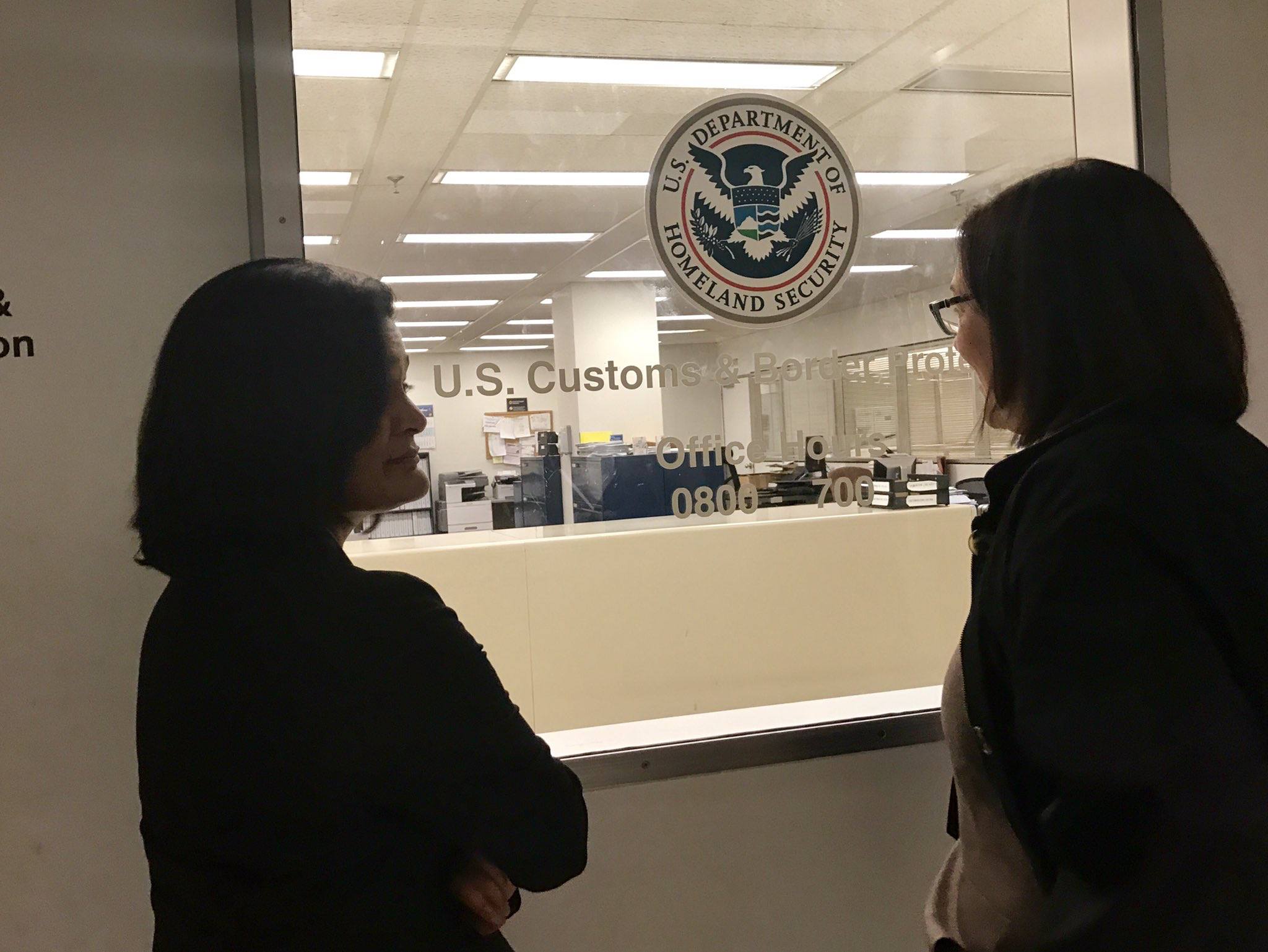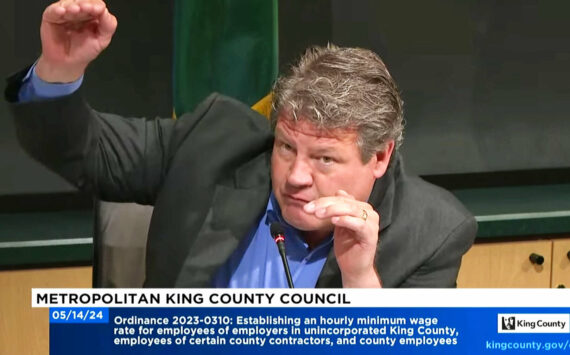At 4:42 p.m. EST last Friday, when President Donald Trump signed a sweeping executive order banning refugees and specific travelers from entering the U.S., it launched a nationwide explosion of resistance, from the airports to the streets to the courts. In Seattle, that resistance was just as swift from elected officials and attorneys as from local residents.
By early Saturday afternoon, Port Commissioner Courtney Gregoire had already raced to Sea-Tac, demanding answers from U.S. Customs and Border Protection (CBP) officials, as had attorneys and staffers from the ACLU of Washington and the Northwest Immigrants Rights Project (NWIRP). By 3 p.m., more than half a dozen elected officials, including Gov. Jay Inslee, Mayor Ed Murray, U.S. Sen. Patty Murray, and U.S. Reps. Pramila Jayapal and Suzan DelBene, had also hightailed it to the airport to use their political muscle to help prevent the deportation of any travelers from the affected countries.
According to Jayapal, DelBene, and Gregoire, CPB officials were hardly forthcoming. “We don’t know exactly how many people are being detained at our airport or what their status is,” Jayapal Tweeted late Saturday afternoon. “This is unacceptable.”
Gregoire had one fruitless initial meeting around 1 p.m. with CPB officers. Jayapal and DelBene then separately demanded an audience with CPB in the late afternoon, and after much cajoling, Sea-Tac staffers escorted the two, along with staffers from Inslee’s and Sen. Murray’s offices, in a van across the tarmac to the CPB office, where they banged on the door for 20 minutes before ultimately getting very little information out of CBP Seattle Port Director Mark Wilkerson.
Wilkerson was in the tricky position of trying to follow the federal orders his office had received while still responding to the political powers standing in front of him (which included Gov. Inslee and Sen. Murray, who’d been patched in via conference call). DelBene has since sent a firm letter to the CBP, demanding to know why “so little information was communicated to members of Congress during her visit to Seattle–Tacoma International Airport (Sea-Tac) on Saturday.” Just before 6 p.m. PST, a New York federal judge issued a restraining order halting the deportation of people who had “arrived in the United States with valid visas or refugee status,” as summarized by The New York Times. According to one person present, Wilkerson did not know about the restraining order until someone showed it to him during the meeting.
Although the final picture is still a bit unclear, The Seattle Times reports that, according to a Port of Seattle official, six people were confirmed to have been detained in Seattle on Saturday as a result of the executive order, and four were to be sent back to the countries they’d arrived from, including one Somali national whose wife came to the U.S. as a refugee and has been living in Seattle for 12 years; she’d been waiting at the airport for her husband to arrive on a flight from Vienna, and he never came.
There was one early legal-resistance success story, though: Two of those four—one from Sudan and one from Yemen—who’d been detained upon arrival were assisted by attorneys from the NWIRP and the ACLU, who raced to support them. One was an engineer attending a conference in the U.S., the other was here to visit family. Both had valid travel visas. NWIRP filed a motion for an emergency stay, citing habeas corpus, and by 8 p.m. Saturday, U.S. District Judge Thomas Zilly had granted the stay, pending further legal review. This prevented their deportation; they were nevertheless held overnight on cots at the airport. But by 7 a.m. Sunday, CBP returned to the two men their visas and released them, with no further legal action necessary. According to the ACLU, the experience wasn’t all bad: While the two men were in CBP custody at Sea-Tac, they were able to watch news coverage of the protests taking place elsewhere at the airport (for more on the protest, see “Flash Flood,” page 6). Both expressed gratitude for that show of solidarity.
Elected officials have continued to castigate the Trump administration for Friday’s order. Jayapal called it “inhumane and barbaric,” Inslee called it a “train wreck,” and Patty Murray called it “appalling and un-American.” The Port of Seattle Commissioners, too, issued a statement on Saturday: “As the government that operates this airport, this executive order runs counter to our values,” the statement reads. “America is great because we are a land of immigrants.”
But all that political denunciation and legal action at the local level did not end over the weekend. On Monday morning, Washington State Attorney General Bob Ferguson announced he would sue the Trump administration and the Department of Homeland Security, arguing that the executive order violates the U.S. Constitution’s equal-protection clause, the First Amendment’s establishment clause, and the federal Immigration and Nationality Act, and infringes the constitutional right to due process. It was the first such lawsuit filed in the country—in part because Ferguson’s team was primed to act on something like this and had committed themselves to working around the clock through the weekend. “We moved quickly,” Ferguson said at a press conference Monday. “Every hour matters. Every day matters. It’s impacting people’s lives in a profound way. That’s why I felt so strongly that it was important to bring a thoughtful lawsuit before the federal court as soon as we possibly could … In a courtroom, it is not the loudest voice that prevails. It’s the Constitution.”
Within 24 hours of the announcement, Ferguson’s suit was no longer alone: Massachusetts Attorney General Maura Healey said Tuesday morning that she has also joined an ACLU suit filed in Boston against the Trump administration for the order; other state attorneys general have told The New York Times that they too are considering taking action.
For her part, Rep. DelBene announced Monday that she is a co-sponsor on the Statue of Liberty Values Act (SOLVE Act), introduced in the U.S. House by Rep. Zoe Lofgren, which “states that President Trump’s executive order will have no effect or force of law and would prohibit any funds or fees from being used to implement the order.”
Also on Monday: The Seattle City Council and the King County Council both passed resolutions condemning the executive order. “In just 10 days, the Trump administration has made a mockery of the Constitution,” said Councilmember and resolution sponsor M. Lorena González prior to the Council’s unanimous vote. The resolution reasserts Seattle’s identity as a sanctuary city by specifically directing the Seattle Police Department not to collaborate with other police departments or agencies to hunt undocumented immigrants, and by creating funding to support families affected by these federal policies, among other things. Likewise, the King County Council’s resolution declared Trump’s executive order “hereby condemned as discriminatory, unconstitutional, and contrary to the county’s adopted principles and 50 ordinances, as well as the Constitution and laws we as a council have sworn to support.”
The flurry of action at every level over a 72-hour period is a likely harbinger of similar efforts to come. Elected officials in Washington state are pulling out all the stops, repeatedly calling on our nation’s system of checks and balances, to prevent the worst from happening. “It’s our job,” said Ferguson on Monday, “to hold everyone to the rule of law. It doesn’t matter if you happen to be the President of the United States.”
sbernard@seattleweekly.com








